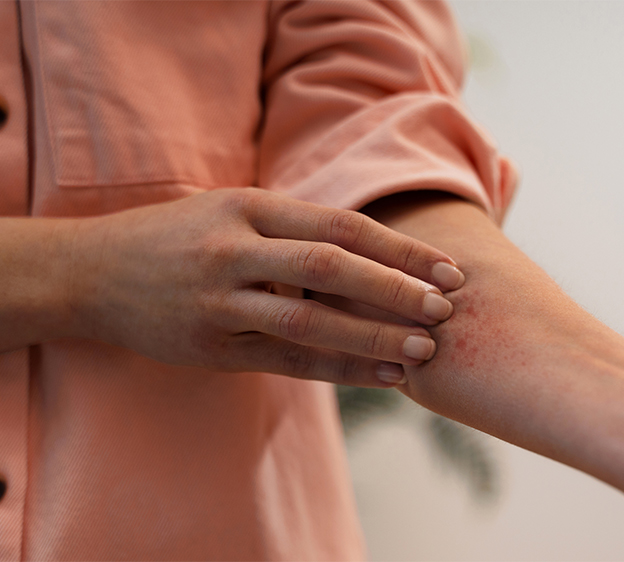
Stress is a constant companion for many in our fast-paced, always-on society. Its effects on mental health are widely acknowledged, but there's a lesser-known side effect: Stress and anxiety can wreak havoc on your skin, manifesting as what's commonly referred to as stress hives.
Though hives, or “urticaria,” aren’t usually dangerous, they can certainly be a nuisance and can last several days or weeks. Knowing how stress is connected to hives can help you understand how to prevent them.
The Skin-Stress Connection
Hives are a common skin condition characterized by red, itchy welts. They can appear anywhere on the body and may vary in size. While allergic reactions are often blamed for hives, stress can also trigger this skin response.
Our body's response to stress includes the release of chemicals like histamine, which can cause hives in some people. Hives result from tiny blood vessels under our skin that leak, pooling to form spots and welts. Stress-induced hives can also result from an increased level of cortisol.
Read More: Three Steps to Less Morning Stress
Identifying Stress Hives
One of the most common questions about hives is how to distinguish between those caused by an allergic reaction and those triggered by stress. Stress hives typically appear suddenly, during or after periods of intense stress or anxiety. Like hives from allergies, they can cause significant discomfort. However, unlike allergy hives, stress hives tend to recur in response to stressors rather than to a specific external allergen.
“When hives are caused by stress, we need open communication with our patients,” says Dr. William P. Clare Jr., board-certified internal medicine specialist at Beaufort Memorial Lady’s Island Internal Medicine. “This way, we can accurately diagnose them and put our patients on the right track for immediate relief.”
Hives aren't limited to specific skin tones; they can affect anyone, regardless of their complexion. Stress hives generally look like raised, red or skin-colored welts, causing burning, itching or stinging.
Treating Stress Hives
Addressing stress hives is a two-pronged approach: managing the hives themselves and reducing overall stress and anxiety. A few ways to manage symptoms and even make stress hives go away include:
- Baths: Bathing in colloidal oatmeal or baking soda solutions can soothe irritated skin.
- Cool compresses: These can help alleviate the itching and discomfort temporarily.
- Moisturizers: Lotion, topical anti-itch creams and other moisturizing products can help when used regularly because they help prevent dry skin.
- Over-the-counter medications: Antihistamines, including oral medications, can be helpful for relief. They block histamine's effects in the body, reducing the itching and appearance of hives. In more severe cases, a doctor may prescribe a stronger medication.
While all these remedies can help, stress hives will return if the underlying factors of stress or anxiety aren’t managed.
Read More: Stress SOS — Calm the Chaos
Managing Stress to Manage Hives
If you don’t want stress hives to be part of your life anymore, learning how to manage stress effectively is the most important step for long-term relief. A few ways to manage your stress include:
- Eat healthily: A diet that’s rich in fruits, vegetables, whole grains and lean proteins can help nourish your body and may help you feel more at ease.
- Get better sleep: Your body needs 7-9 hours of sleep each night for adequate rest and recharging, helping you feel your best in daily life and handle stressful situations.
- Get regular exercise: Exercise naturally helps reduce stress, releases endorphins, and boosts energy and confidence.
- Practice mindfulness: Whether through meditation, journaling, sketching or deep breathing, staying focused on the positive and being present in each moment will help you manage stress.
- Reach out: Connect with friends and family regularly, even if it can’t be in person. Spending time with the people we care about and who care about us in return is a great way to remember that we don’t have to internalize stress.
- Try yoga: Yoga is great for the body, mind and spirit. Studies have shown a significant connection between yoga and lowering your stress levels.
Speak with a health care provider about the best ways to control your stress.
“Stress is a natural part of life, but when it starts causing health issues, such as hives, talk to your health care provider,” Dr. Clare says. “Ask them to help you find the best stress-relieving path.”
When to Seek Professional Care
Stress hives can usually be managed at home, but there are times when professional medical care is necessary. If any of these symptoms occur, visit a Beaufort Memorial Express Care Clinic or contact your primary care provider:
- Hives persist for a couple of days or longer
- Hives recur frequently
If hives are accompanied by other symptoms like fever, swelling in the mouth or throat or problems breathing, it could be a serious allergic reaction, and you should seek immediate medical attention.
Read More: Allergic Reactions: Know When to Go to the ER
Understanding and treating stress hives requires a nuanced approach, acknowledging the intricate links between our mental health and our bodies, including our skin. By recognizing the symptoms and common triggers of stress hives, you can take steps to manage your skin symptoms and reduce stress. Managing stress and caring for your skin aren't just acts of self-care — they're steps towards a healthier, happier life.
“I think a lot of our patients with stress hives don’t realize their bodies are telling them they need to manage their stress better,” Dr. Clare says. “Stress can be toxic when it’s not handled appropriately. Trying to ignore it can make your body react visibly to show there’s an issue.”
Start a Video Visit or find an Express Care Clinic near you.

